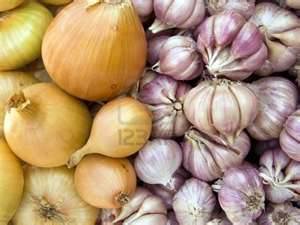 I have been attending herbal classes. While I know some of the benefits of the nutritional properities of some herbs, I always enjoy learning more. So I thought I would share the benefits of onions & garlic.
I have been attending herbal classes. While I know some of the benefits of the nutritional properities of some herbs, I always enjoy learning more. So I thought I would share the benefits of onions & garlic.
The distinctive odor that garlic produces doesn’t occur until it is crushed. This is the plant’s defense mechanism against insect predators. Garlic cloves contain an odorless , sulfur-containing phytochemical called “alliin.” When the clove is disrupted, alliin is released and reacts with an enzyme in the neighboring cells that converts it to the odoriferous “allicin.” Allicin is the garlic’s bug repellant – and a “people” repellant which is why many folks are shy about eating it. If that’s the case, roast or cook whole to avoid the smell.
It’s known as an antiviral, aids in the lowering of cholesterol (see previous blog post), stimulates circulation and boosts the immune system. Plus it tastes yummy 🙂
Onions are garlic’s kissing cousin. They are rich in bioflavonoids, including quercetin found in yellow onions. It is very heat stable which means you can cook it for long periods of time. Think caramelized onions…yummy! Eating about 1-2 tablespoons of caramelized onions (rich in quercetin) has been shown to improve immunity and reducing the inflammation of allergies. Histamine is released by the mast cell walls which causes a cascade of leaky blood vessels. This leads to sniffling due to the production of mucous. Quercetin can help stablize those mast cell walls decreasing the inflammation and reducing the allergies.
Studies have shown that quercetin also protects against cataracts, cardiovascular disease, and cancer. In addition, onions contain a variety of other naturally occurring chemicals known as organosulfur com-pounds that have been linked to lowering blood pressure and cholesterol levels. See there…good for cholesterol.
How to combine onions and garlic? Well, our friends from Bon Appetit magazine has provided us with this recipe that works well on top of crusty bread, inside a sandwich, or on pizza (no sauce necessary). Note: I have adjusted the recipe to add garlic into the recipe at the last 10 minutes of cooking the onions. Yes, carmelizing onions does take some time. I also would not add the butter…but that’s me 🙂
Caramelized Onion, Rosemary, Garlic, and Pine Nut Topping
Makes about 1 1/2 cups
Recipe by Tori Ritchie
Ingredients
- 1 tablespoon butter
- ¼ cup olive oil
- 1 ¼ pounds onions, thinly sliced
- 2-3 garlic cloves, minced
- 1 tablespoon chopped fresh rosemary
- ½ teaspoon fine sea salt
- 3 tablespoons pine nuts, toasted
Preparation
Melt butter with oil in heavy large skillet over medium-high heat. Add onions; sauté until tender, about 5 minutes. Reduce heat to low; mix in rosemary and salt. Sauté until onions are golden, about 30 minutes. The last 10 minutes of cooking add garlic. Season with pepper. Cover and chill up to 3 days. Stir in pine nuts before using.

